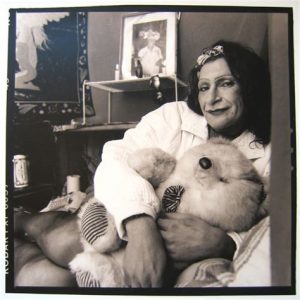By: Erin Delaney

Sylvia Rivera was born on July 2, 1951 and died February 19, 2002. She’s best known for her advocacy of trans rights; “Rivera was influential in forming the Gay Liberation Front and the Gay Activist Alliance” (Singleton). As a resident of New York, she was a member and initiator of the Stonewall Riot of 1969. While most people know her for her trans activism, she also, “fought hard against the exclusion of transgender people from the Sexual Orientation Non-Discrimination Act in New York and was a loud and persistent voice for the rights of people of color and low-income queers and trans people” (Who Was Sylvia Rivera?). It can be argued that Rivera was a prominent voice for trans people, as well as cared for and wanted equality for all those who suffered from racism, sexism, ableism, and gender discrimination.
Her early story begins in New York, born to a Puerto Rican father and a Venezuelan mother. Despite her racial depiction of her appearance in the movie, “Stonewall” as white, she was a trans minority. Orphaned at the age of 10, Rivera was working as a prostitute in New York City (Reyes). Due to these life experiences, there’s a correlation between her desire for equality and humanity efforts. Rivera initially joined the gay rights movement and recognized the need for more inclusivity among the movement (Reyes).
Rivera’s role in the Stonewall Riot is a major aspect of what she’s known for today. She’s cited as saying, “I’m not missing a minute of this. It’s the revolution!” (Singleton). Later in her life, Sylvia Rivera and Marsha P. Johnson founded STAR (Street Transvestite Action Revolutionaries). As Rivera put it, “STAR was for the street gay people, the street homeless people, and anybody that needed help at that time” (Feinberg). Her role in the community can still be felt today through similar programs such as the Ali Forney Center, Audre Lorde, Pride Center of Staten Island, and many more (“LGBTQIA”) that aim to aid and protect members of the LGBTQIA+ community in New York City alone.
As these groups and movements during Rivera’s life became more inclusive and mainstream, Rivera had less of a role. She said, “When things started getting more mainstream… it was like, ‘We don’t need you no more’” (Singleton). She was put on a shelf, nearly forgotten until the late twentieth century where she was remembered for her advocacy during the Stonewall riot and still holds recognition for her role in it. Though few remember who Sylvia Rivera is today, the impact of her actions can be felt throughout the LGTBQIA+ community. She, as well as others was a pioneer for trans rights and ultimately human rights.
Works Cited
Feinberg, Leslie. “Street Transvestite Action Revolutionaries.” Jackie Robinson’s Historic Impact, Workers World, 24 Sept. 2006, 11:53pm, www.workers.org/2006/us/lavender-red-73/.
“LGBTQIA .” We Are New York Values, www.wearenewyorkvalues.org/lgbtqia.
Reyes, Paul A. “A Forgotten Latina Trailblazer: LGBT Activist Sylvia Rivera.” NBCNews.com, NBCUniversal News Group, 6 Oct. 2015, 7:25am, www.nbcnews.com/news/latino/forgotten-latina-trailblazer-lgbt-activist-sylvia-rivera-n438586.
Singleton, Dave. “Hispanic Transgender Rights Activist Sylvia Rivera – AARP VIVA.” AARP, 1 July 2009, www.aarp.org/politics-society/rights/info-06-2009/legacy-sylvia-rivera.html.
Tumblr_m1i5zlkmlf1qjeot1o1_1280.Jpg (JPEG Image, 531 × 534 Pixels). https://srlp.org/wp-content/uploads/2012/08/tumblr_m1i5zlkmlf1qjeot1o1_1280.jpg. Accessed 4 Dec. 2018.
“Who Was Sylvia Rivera?” SRLP (Sylvia Rivera Law Project), 31 Mar. 2014, srlp.org/about/who-was-sylvia-rivera/.